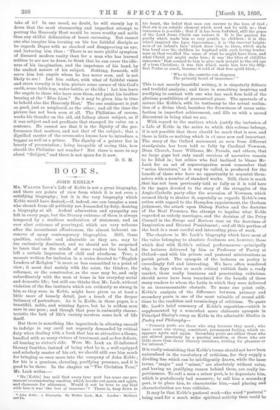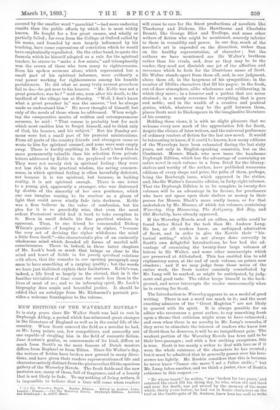BOOKS.
JOHN KEBLE.* Mn. WALTER Loon's Life of Keble is not a great biography, and there are points of view from which it is not even a satisfying biography ; but it is the very biography which Keble would have desired,—if, indeed, one can imagine a man who shrank from all publicity not demanded by duty, desiring a biography at all. Ardent admiration and sympathy are felt in every page, but the literary outcome of them is always tempered by a studious moderation of statement, and an ever alert reticence of pourtrayal, which are very welcome after the incontinent effusiveness, the almost indecent un- reserve of many contemporary biographies. Still, these qualities, valuable and admirable as they are, may be too exclusively dominant, and we should not be surprised to learn that on the minds of some readers the book had left a certain impression of chill and aloofness. True, a memoir written for inclusion in a series devoted to "English Leaders of Religion" is more or less committed to a point of view; it must deal mainly with the saint, the thinker, the reformer, or the constructor, as the case may be, and only subordinately with the man at home in his everyday social and domestic life ; but still one thinks that Mr. Lock, without violation of the fine instincts which are evidently as strong in him as they were in Keble, might have given us at least a little more of homely detail, just a touch of the deeper intimacy of portraiture. As it is, Keble, in these pages, is a beautiful, noble, and winning figure, but he is seldom seen save in one pose ; and though that pose is eminently charac- teristic, the lack of life's variety involves some lack of life itself.
But there is something like ingratitude in allowing oneself to indulge in any cavil not urgently demanded by critical duty when dealing with a book that has so attractive a theme, handled with so many virtues of treatment, and so few defects, all leaning to virtue's side. Were Mr. Lock an ill-informed literary fumbler, instead of being what he is, a well-equipped and scholarly master of his art, we should still owe him much for bringing us once more into the company of John Keble ; for his is a gracious, elevating, purifying presence, and it is good to be there. In the chapter on "The Christian Year," Mr. Lock writes :-
"He [Keble] has said that every true poet has some one per- raanent overmastering emotion, which breaks out again and again, and clamours for utterance. Would it not be true to say that with him it was 'the love of innocence ' ? There is, deep down in • John Kahle a Biography. By Walter Look, M.A. London: Methuen and Co. his heart, the belief that man can answer to the love of God ; that sin is an outside element which need not be with us ; that innocence is possible ; that if it has been forfeited, still the grace of the Lord Jesus Christ can restore it. It is the passion for purity which made him so very gentle to children ; it is this which inspired the Lyra innocentium ; it is 'the innocent bright- ness of an infant's face' which drew him to them, which made him bend over the children he baptised with such loving tender- ness an they recalled the sense of what he might have been, and what Christ yet might make him ; it was the bliss of childlike innocence' that seemed to him to give such insight to the old age of a true Christian; it was this which made him love the fifty- first Psalm so much, because it told of that free spirit blest,—
' Who to the contrite can dispense The princely heart of innocence.'" This is not merely beautiful writing, it is singularly delicate and truthful analysis ; and there is something inspiring and purifying in contact with one who has such firm hold of the glorious possibilities of guaranteed grace. The spectacle of a nature like Keble's, with its testimony to the actual realisa- tion of a divine ideal, banishes the drowsiness of mean satis- faction in imperfect achievement, and fills us with a sacred discontent in being what we are.
With regard to the matters which justify the inclusion of a Life of Keble in the series to which this volume belongs, it is not possible that there should be much that is new, and there is little or nothing which is e t once new and important. The story of the Oxford movement as seen from different
standpoints, has been told so fully by Cardinal Newman, Dean Church, Isaac Williams, Mr. Fronde, and others, that no large gaps but only small crevices of narrative remain to be filled in ; but critics who feel inclined to blame Mr. Lock for an act of supererogation must remember that "series literature," as it may be called, is produced for the benefit of those who have no opportunity to acquaint them- selves with a number of standard works. Still, there is much that has not been previously told so fully as it is told here in the pages devoted to the story of the struggles of the Anglo-Catholic party after the secession of Newman, which seemed likely to shatter it, especially as regards Keble's own action with regard to the Hampden appointment, the Gorham judgment, the attack upon Bishop Forbes and the doctrine of the Real Presence, the attempt to legalise what Keble regarded as unholy marriages, and the decision of the Privy
Council in the Essays and Reviews case on the doctrines of Inspiration and Eternal Punishment ; and all this portion of
the book is a most careful and interesting piece of work.
The chapters in Mr. Lock's biography which have most of the value belonging to absolute freshness are, however, those which deal with Keble's critical performances—principally the lectures delivered by him as Professor of Poetry at Oxford—and with his private and pastoral ministrations as parish priest. The synopsis of the lectures on poetry is exceedingly fall and interesting. We have often wondered why, in days when so much critical rubbish finds a ready market, these really luminous and penetrating criticisms, should never have been translated for the benefit of those
many readers to whom the Latin in which they were delivered is an insurmountable obstacle. To name one point only, Keble's analysis of the difference between primary and secondary poets is one of the most valuable of recent addi- tions to the tradition and terminology of criticism, To quote Mr. Lock's brief summary of Keble's exposition—which is supplemented by a somewhat more elaborate synopsis in
Principal Shairp's essay on Keble in the admirable Studies in Poetry and Philosophy- " Primary poets are those who sing because they must ; who have some one strong, consistent, permanent feeling, which re- appears again and again. Secondary posts are either those who are stirred genuinely by a passing emotion, or those who are little more than clever literary imitators, writing for pleasure or for interest."
It is really astonishing that Keble's terms should not have been naturalised in the vocabulary of criticism, for they supply a. dividing line which can be intelligently drawn, while the loose terms, "major" and "minor," are absolutely without value, and having no justifying reason behind them, are really pertinences. To call a man a minor poet, is to depreciate him, which is gratuitously bad manners ; to call him a secondary poet, is to place him, to characterise him,—and placing and
characterisation are true criticism.
It may be that Keble's pastoral work—the word "pastoral"
being used. for a much wider spiritual activity than could be covered by the smaller word "parochial "—had more enduring results than the public efforts by which he is most widely known. He fought for a few greet causes, and wholly or partially failed ; for even from the College at Oxford called by his name, and founded by men largely influenced by his teaching, have come expressions of conviction which he would have emphatically repudiated. On the other hand, to quote the formula which he himself adopted as a rule for the spiritual teacher, he strove to "make a few saints," and triumphantly won the crown of those who turn many to righteousness. Even his spoken sermons alone, which represented but a small part of his spiritual influence, were evidently a real power working for righteousness among his humble parishioners. He did what so many truly earnest preachers fail to do,—he got near to his hearers. "Mr. Keble was not a great preacher, was he ? " said one, soon after his death, to the landlord of the village inn at Hursley. "Well, I don't know what a great preacher is," was the answer, "but he always made us understand him." He never thought of himself, but only of the needs of those whom he addressed. When weigh- ing the comparative merits of written and extemporaneous sermons, he said : "That course is probably best for each which most enables him to forget himself, and to think only of God, his hearers, and his subject." But his Sunday ser- mons were but a small part of his pastoral ministrations. From all parts of the country friends and strangers came or wrote to him for spiritual counsel, and none were sent empty away. There is hardly anything in Mr. Lock's book that is more permanently valuable than his selection from private letters addressed by Keble to the perplexed or the penitent. They were not merely rich in spiritual feeling: they were not less rich in the practical wisdom, the saving common- sense, in which spiritual feeling is often harmfully deficient, not because it is too spiritual, but because, in lacking reality, it is not spiritual enough. There is one letter to a young girl, apparently a stranger, who was distressed by doubts of the sincerity of her own penitence, which one can imagine coming to its receiver as a gleam of light that could never wholly fade into darkness. Keble was a firm believer in the value of confession, but his plea for it is so guardedly wise, that even the most ardent Protestant would find it hard to take exception to it. Even in small details his fine practical wisdom is apparent. Thus, to one friend he commended Bishop Wilson's practice of keeping a diary in cipher, "because the very act of devising the cipher withdraws the mind a little from itself,"—the characteristic plea of an eminently wholesome mind which dreaded all forma of morbid self- consciousness. There is, indeed, in these latter chapters of Mr. Lock's book so much that brings us close to the mind and heart of Keble in his purely spiritual relations with others, that the remarks in our opening paragraph may seem to have something of a carping quality ; but the words we have just italicised explain their limitations. Keble's was, indeed, a life lived so largely in the eternal, that in it the familiar trivialities of time count for much less than, in the lives of most of us ; and to its informing spirit, Mr. Lock's biography does ample and beautiful justice. It should be added that an autotype from Mr. Richmond's portrait pro- vides a welcome frontispiece to the volume.



































 Previous page
Previous page